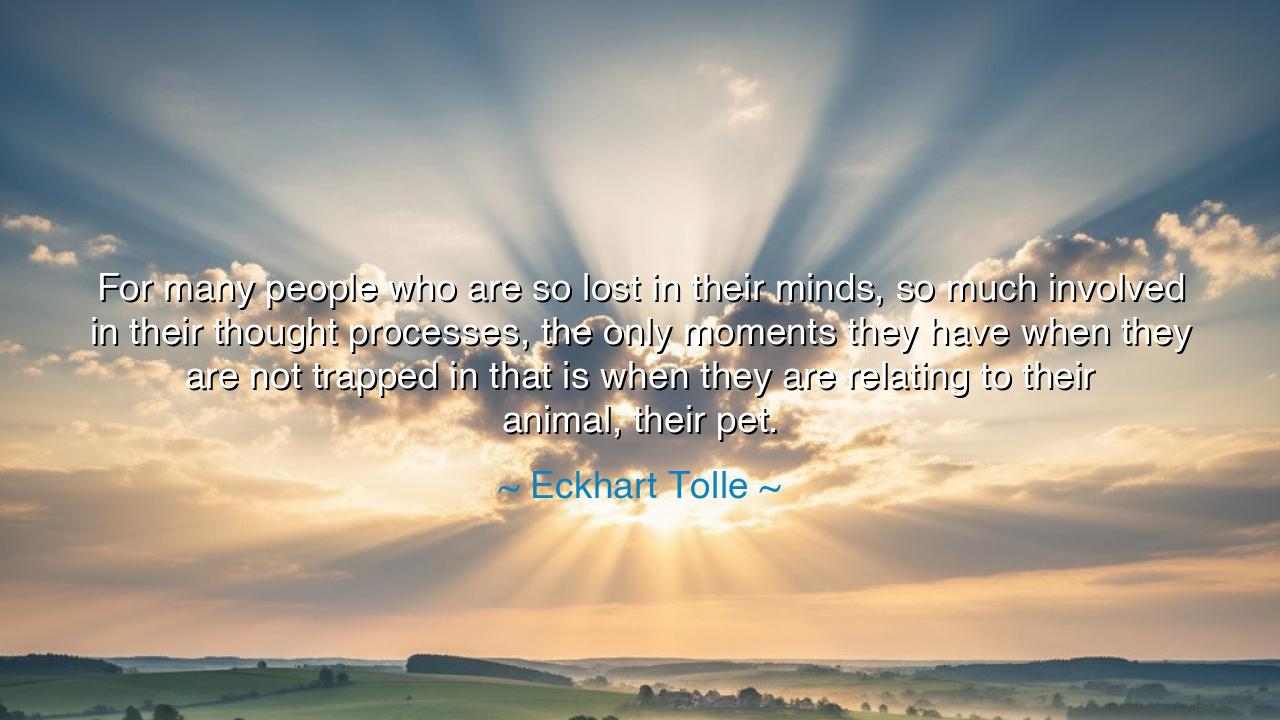
For many people who are so lost in their minds, so much involved
For many people who are so lost in their minds, so much involved in their thought processes, the only moments they have when they are not trapped in that is when they are relating to their animal, their pet.






Hear the words of the sage Eckhart Tolle, who declared: “For many people who are so lost in their minds, so much involved in their thought processes, the only moments they have when they are not trapped in that is when they are relating to their animal, their pet.” At first, this seems but a reflection on the simple comfort of companionship. Yet beneath it flows a profound river of wisdom: that in the presence of creatures, unburdened by past or future, the weary human spirit finds a doorway to the present moment, to freedom from the ceaseless prison of thought.
For man is often a prisoner of his own mind. He dwells in what has been, chained by memory, or he wanders in what may be, consumed by fear and desire. His thought processes, though noble in design, become tyrants when unguarded, dragging him endlessly away from the simple truth of “now.” But the pet—the dog wagging its tail, the cat resting in the sun, the bird singing in the morning—dwells in no such prison. It lives fully, wholly, in the moment, and in its presence, man too is invited into stillness.
The ancients knew this truth, though in other forms. The Stoics, like Marcus Aurelius, warned against being “lost in thought,” urging instead to return again and again to the present, the only moment where life truly resides. The Buddha, long before, spoke of the restless monkey mind, forever leaping from branch to branch, and he taught meditation as the art of stilling it. Tolle, in his wisdom, shows that even those who cannot silence themselves in solitude may yet find peace in the silent companionship of an animal.
Consider the story of Helen Keller, who lived in darkness and silence, cut off from the world of human language. Yet before words reached her, she found solace in the presence of animals. They asked nothing of her, demanded no speech, but simply were. In their stillness, she felt connection, love, and presence beyond thought. This mirrors Tolle’s teaching: that the purity of an animal can touch the human soul in ways that thought and intellect cannot.
There is also here a lesson in humility. For man, who crowns himself ruler of creation, must look to his pet to be reminded of how to live. The dog does not dwell on yesterday’s scolding; the cat does not plot tomorrow’s meals with anxiety. They breathe, they move, they love, and they rest. They are teachers in fur and feather, showing man what he has forgotten: how to simply be.
Yet Tolle also offers warning: that if the only moments of presence are with one’s animal, then much of life remains shackled. The pet may be the doorway, but the human must learn to carry that same presence into every moment—into work, into relationships, into silence. The gift of the animal is to remind us of our nature; the responsibility of the human is to live by that reminder.
Thus the teaching is clear: do not despise your restless mind, but do not let it enslave you. Learn from your pet, who dwells in the eternal present without worry or regret. Let their simplicity draw you into stillness, and from that stillness, find freedom. For the greatest gift your animal gives you is not companionship alone, but the invitation to awaken.
So let your action be this: the next time you sit with your dog, or stroke your cat, or watch your bird sing, do not see it as small or ordinary. See it as a lesson. Let their presence draw you out of thought and into now. Breathe, listen, and be. And then carry that awareness into your human affairs, so that you may live not as one forever trapped in the storm of mind, but as one free, awake, and alive to the eternal moment.






AAdministratorAdministrator
Welcome, honored guests. Please leave a comment, we will respond soon